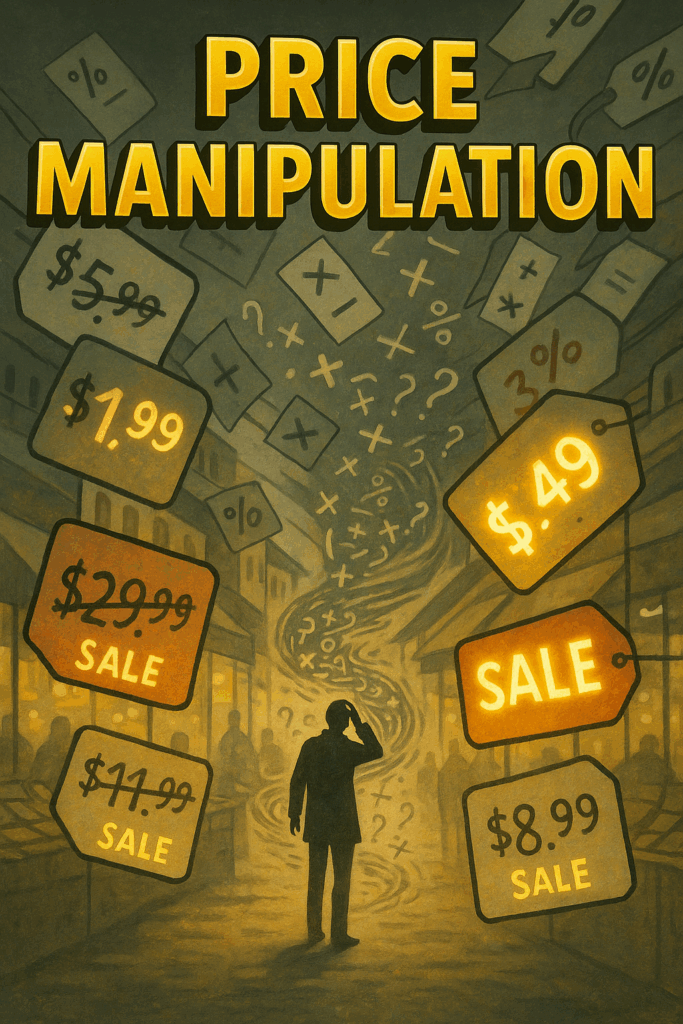
You’re scrolling through your phone when an ad pops up: “Last chance! Only 2 hours left to save 70%!” Your heart rate jumps. You click before you can think twice. Later, you wonder why you bought something you didn’t even need.
That wasn’t weakness. That was mind control.
When someone says “mind control,” your brain probably jumps to hypnotic villains in movies or cult leaders with glowing eyes. The reality hits much closer to home. Right now, someone is trying to influence your thoughts, decisions, or behavior. Maybe it’s your boss using guilt to make you work late. Perhaps it’s a dating app notification designed to trigger fear of missing out. Or it could be a politician using your deepest anxieties to win your vote.
Mind control isn’t about mystical powers or science fiction gadgets. It’s psychology weaponized. Every day, people use specific techniques to bypass your logical thinking and trigger automatic responses. These methods work because they target basic human instincts – our need to belong, our fear of loss, our respect for authority.
The scary part? Most of these techniques fly under your radar. You don’t realize your thoughts are being shaped until after you’ve already said yes, bought the product, or changed your mind.
But here’s what changes everything: once you recognize these tactics, they lose their power over you.
In this article, you’ll discover nine manipulation techniques that surround you daily. You’ll see exactly how they work, why your brain falls for them, and what you can do to protect yourself. Some of these methods might shock you with their simplicity. Others will make you realize why certain conversations or situations always left you feeling confused or drained.
Knowledge becomes your shield. When you understand the game, you can choose whether or not to play.
What Is Mind Control in Psychology?
Mind control sounds dramatic, but psychologists use more precise terms: influence, persuasion, and manipulation. These three words might seem similar, but they represent very different approaches to changing someone’s mind.
Influence happens naturally in healthy relationships. Your friend recommends a restaurant because they genuinely enjoyed it. A teacher explains why studying matters for your future. Your doctor suggests lifestyle changes to improve your health. These people want good outcomes for you, and they’re transparent about their motives.
Persuasion involves more structure and technique, but it still operates in the open. A lawyer presents evidence to convince a jury. An environmental activist shares facts about climate change to shift public opinion. A parent explains why curfews keep teenagers safe. The persuader has a goal, but they respect your right to disagree and make your own choice.
Manipulation crosses the line into darker territory. Here, the manipulator prioritizes their wants over your well-being. They use deception, emotional pressure, or psychological tricks to get what they want. Most importantly, they hide their true intentions from you.
The difference comes down to three key factors: honesty, respect, and outcome.
Honest influence admits its purpose upfront. Manipulation operates in shadows, using misdirection and lies. Respectful persuasion accepts “no” as an answer. Manipulation applies pressure until you crack. Good influence aims for outcomes that benefit everyone involved. Manipulation serves only the manipulator’s interests.
Your brain processes all three the same way initially. Whether someone influences, persuades, or manipulates you, the same psychological mechanisms activate. You feel emotions, weigh social pressure, and make quick judgments based on limited information. This similarity explains why manipulation works so well – it hijacks the same mental shortcuts you use for legitimate decision-making.
The techniques you’ll learn about next exist on a spectrum. Some lean toward legitimate persuasion when used ethically. Others always signal manipulation. The context and intent make all the difference. A salesperson mentioning scarcity might genuinely want to help you avoid missing out on a good deal. A romantic partner using the same technique to rush you into commitment shows manipulation in action.
Your goal isn’t to become suspicious of everyone around you. Instead, you want to develop radar that detects when someone crosses from honest influence into manipulative territory.
Everyday Mind Control Techniques You Encounter
1. Gaslighting

“That never happened. You’re remembering it wrong.” “You’re being too sensitive.” “I never said that – you’re imagining things.”
Gaslighting makes you doubt your own memory, perception, and sanity. The gaslighter contradicts your version of events so consistently that you start questioning what’s real. Over time, you lose confidence in your own judgment and become dependent on their version of reality.
You’ll encounter this in toxic relationships where a partner denies obvious lies or rewrites history to avoid accountability. Workplace gaslighters dismiss your valid concerns as “overreactions” or claim credit for your ideas while insisting they never took anything from you. Some politicians use gaslighting on a massive scale, denying documented facts while labeling contradictory evidence as “fake news.”
Red flag phrases: “You’re crazy,” “That didn’t happen,” “You’re too emotional,” “Nobody else has that problem,” “You’re imagining things.”
This technique works because humans need reality to make sense. When someone confident repeatedly contradicts your experience, your brain starts second-guessing itself. Most people assume others wouldn’t lie so boldly about obvious facts, so they conclude their own memory must be flawed.
2. Love Bombing

Picture this: you meet someone who seems perfect. They shower you with attention, gifts, and compliments. They text constantly, want to spend every moment together, and talk about your amazing future after just a few dates. It feels incredible – until it doesn’t.
Love bombing overwhelms targets with excessive affection, attention, and admiration during the early stages of a relationship. The bomber creates an artificial high that feels addictive. Once you’re hooked, they gradually withdraw the intense attention, leaving you desperate to get back to that initial euphoria.
Dating manipulators use love bombing to bypass your natural caution around new relationships. Cult recruiters love bomb potential members with instant acceptance and belonging. Even sales teams employ milder versions, treating prospects like VIPs before revealing the hard sell.
Red flag phrases: “I’ve never met anyone like you,” “We’re soulmates,” “I want to give you everything,” “You’re perfect,” delivered within days or weeks of meeting.
Your brain craves the dopamine hit from all that positive attention. When someone makes you feel incredibly special very quickly, logic takes a backseat to emotion. The intensity creates artificial intimacy that feels deeper than it actually is.
3. Fear Appeals
“If you don’t buy life insurance, what happens to your family?” “Crime rates are soaring – you need this security system.” “Your computer could be hacked right now – download our protection software immediately.”
Fear appeals work by presenting a scary scenario, then offering their solution as the only way to avoid disaster. The technique bypasses rational thinking because fear triggers your brain’s survival mode. When you’re scared, you make quick decisions to eliminate the threat.
Advertisers use fear to sell everything from insurance to cleaning products. Politicians win votes by making you afraid of the other candidate or party. Some parents rely on fear-based warnings to control children’s behavior, though this often backfires.
Red flag phrases: “What if something happens to…” “Don’t risk it,” “You can’t afford not to…” “Time is running out,” “Protect yourself before it’s too late.”
Fear activates your amygdala, the brain’s alarm system. This ancient response helped humans survive genuine threats, but modern manipulators exploit it for non-emergency situations. When afraid, you focus on eliminating the scary feeling rather than evaluating whether the fear makes sense.
4. Social Proof

“Join 50,000 satisfied customers!” “This is our best-selling item!” “Everyone in your neighborhood is switching to our service!”
Social proof convinces you that something must be right because many other people are doing it. The technique leverages your deep need to fit in and avoid being left out of positive group experiences.
You see social proof everywhere: product reviews, testimonials, crowded restaurants, trending hashtags, and waiting lists. Even fake versions work – manipulated review counts, paid crowds, and artificial scarcity designed to suggest popularity.
Red flag phrases: “Everyone is doing it,” “Don’t be the only one without…” “Join the thousands who…” “Most people choose…” “The popular choice…”
Humans survived by staying with the group. Your brain assumes that if many people make the same choice, they must know something you don’t. This shortcut usually works well, but manipulators create artificial crowds or highlight irrelevant groups to trigger your follow-the-herd instinct.
5. Authority Influence

The doctor recommends expensive supplements. Your boss suggests working weekends shows “commitment.” An influencer with millions of followers promotes a sketchy investment opportunity.
Authority influence exploits your natural tendency to defer to expertise, status, or power. People comply with authority figures even when the request makes them uncomfortable or seems wrong.
This shows up when professionals abuse their credentials to push unnecessary services. Social media influencers leverage follower counts to seem more credible than they are. Even fake authority works – people in lab coats selling health products or actors playing doctors in commercials.
Red flag phrases: “As an expert, I recommend…” “Trust me, I’m a…” “Studies show…” (without citing actual studies), “Professional opinion…” “Years of experience tell me…”
Your brain developed shortcuts to identify trustworthy leaders and experts. These mental rules helped humans learn from knowledgeable tribe members, but they activate even when someone just looks or sounds authoritative. Real expertise requires verification, not just impressive credentials.
6. Reciprocity Trick

The car salesman offers free coffee and spends an hour chatting about your family. The store gives you a small free sample. A colleague does you an unexpected favor. Later, when they ask for something in return, saying no feels almost impossible.
Reciprocity creates obligation through gifts, favors, or kindness. The giver expects something back, usually worth more than their original investment. This technique works because refusing to reciprocate makes most people feel guilty and selfish.
Businesses offer free trials, samples, and consultations knowing some recipients will feel obligated to buy. Manipulative people do unsolicited favors to create debt they can collect later. Even small gifts trigger the reciprocity response.
Red flag phrases: “Since I did this for you…” “After everything I’ve given you…” “You owe me,” “I went out of my way for you,” “Remember when I helped you…”
Reciprocity helped early humans build cooperative relationships essential for survival. Your brain tracks social debts and credits automatically. Manipulators exploit this by giving first, then collecting disproportionate returns while making you feel ungrateful for hesitating.
7. Anchoring

“This car normally sells for $30,000, but today only, I can offer it to you for $22,000.” “Our premium package is $500 per month, but our basic plan is just $199.” “I was hoping to get $800 for this, but I’ll accept $600.”
Anchoring plants a high number in your mind first, making subsequent offers seem reasonable in comparison. The initial price becomes your reference point for judging value, even when that first number was completely arbitrary.
Retailers use anchoring with “original prices” and “sales.” Negotiators start with extreme positions to make their real target seem moderate. Even restaurants place expensive items on menus to make mid-range options appear more reasonable.
Red flag phrases: “Normally this costs…” “Originally priced at…” “My first offer is…” “The regular price…” “Compared to what others charge…”
Your brain struggles to ignore the first number it hears, even when you know it’s inflated. This cognitive bias served humans well when estimating quantities in nature, but manipulators use it to distort your perception of fair prices and reasonable requests.
8. Foot-in-the-Door Technique
“Would you sign this petition for cleaner parks?” After you agree, they continue: “Great! Since you care about the environment, would you consider a monthly donation to our organization?”
This technique starts with a small, easy request that most people will accept. Once you comply, the manipulator follows up with their real ask – something larger that you might have refused initially. Having already said yes once, you’re more likely to agree again.
Political campaigns use this progression: sign up for updates, attend a rally, volunteer for phone calls, then donate money. Sales teams might ask for just a few minutes of your time, then extend the conversation toward a purchase. Online forms request your email for a “free guide,” then bombard you with sales pitches.
Red flag phrases: “Just a quick question…” “This will only take a minute…” “Since you already…” “One more small thing…” “Now that you’ve started…”
Consistency matters deeply to humans. Once you identify as someone who supports a cause or engages with a company, your brain wants your future actions to match that identity. Small commitments create psychological momentum toward larger ones.
9. Scarcity Effect

“Only 3 left in stock!” “This offer expires at midnight!” “We can only accept 10 more applications!” “I have another buyer coming to see this tomorrow!”
Scarcity makes things seem more valuable simply because they’re hard to get. The technique triggers your fear of missing out and forces quick decisions before you can think carefully or comparison shop.
Retailers create artificial scarcity with countdown timers and limited quantities. Real estate agents mention other interested buyers to pressure quick offers. Even subscription services limit access to create exclusive communities that feel more desirable.
Red flag phrases: “Last chance,” “Limited time only,” “Going fast,” “Don’t miss out,” “Only a few left,” “This won’t last long.”
Your brain evolved to grab resources when they became scarce. This instinct helped humans survive famines and competition, but modern marketers manufacture fake scarcity to trigger the same urgent response. Real scarcity requires verification – check if the “limited offer” reappears next week.
Why These Techniques Work
Your brain didn’t evolve for the modern world. The same mental shortcuts that kept your ancestors alive now make you vulnerable to manipulation.
Thousands of years ago, humans lived in small tribes where survival depended on group cooperation. If the tribe rejected you, you died. This created powerful psychological drives that still control your behavior today: the desperate need to belong, the fear of being left behind, and the instinct to follow leaders who seemed confident and knowledgeable.
These survival mechanisms happen automatically, below your conscious awareness. When someone uses social proof, your ancient brain screams “Everyone else is doing this – I’ll die if I don’t join them!” When authority figures speak, deeper instincts whisper “This person has power – defying them means danger.” When faced with scarcity, your primitive mind panics: “Resources are disappearing – grab what I can now!”
Fear drives many of these responses. Humans survived by avoiding threats, not by careful analysis of whether dangers were real. Your brain assumes scary situations require immediate action. Manipulators exploit this by creating artificial urgency around non-threatening situations like missing a sale or choosing the wrong insurance policy.
The need to belong runs even deeper than fear. Isolated humans died quickly in prehistoric environments, so your brain treats social rejection like a physical threat. This explains why peer pressure feels so overwhelming and why fitting in often matters more than being right. When someone uses social proof or love bombing, they’re hacking millions of years of evolution that scream “belonging equals survival.”
Loss hurts more than equivalent gains feel good. Your ancestors who protected what they had survived better than those who took risks for potential rewards. This “loss aversion” explains why scarcity tactics and fear appeals work so well. The thought of losing something you already have – or might have – creates stronger motivation than the possibility of gaining something new.
Authority influence taps into your brain’s leadership recognition system. Early humans who quickly identified and followed capable leaders survived better than those who questioned every decision during crises. Your brain still looks for confidence, status symbols, and expertise as markers of trustworthy authority, even when these signals can be faked.
Trust developed as a survival tool too. Humans who cooperated effectively outcompeted individualistic groups. Your default setting assumes others are telling the truth because constant suspicion would have destroyed the social bonds necessary for survival. Manipulators abuse this by lying confidently, knowing your brain wants to believe them.
Finally, cognitive shortcuts help you make quick decisions with limited information. Your brain can’t analyze every choice carefully – you’d never leave the house if you tried. Instead, you rely on mental rules like “expensive means high quality,” “crowds indicate good choices,” and “confident people usually know what they’re talking about.” These shortcuts work most of the time, but manipulators design situations where your mental shortcuts lead to wrong conclusions.
Understanding these psychological foundations changes everything. When you feel that urgent need to act immediately, that’s often manipulation targeting your fear systems. When someone makes you feel incredibly special very quickly, they might be exploiting your belonging instincts. When you want something more because it seems rare, question whether the scarcity is real or manufactured.
Your instincts aren’t wrong – they just weren’t designed for people who intentionally exploit them.
How to Recognize and Protect Yourself
Awareness alone cuts manipulation power in half. When you recognize what’s happening, you can step back from automatic responses and make deliberate choices instead.
Start watching for emotional spikes during conversations or decision-making situations. Manipulators rely on keeping you in heightened emotional states where logical thinking shuts down. If you suddenly feel urgent, guilty, excited, or scared during an interaction, pause and ask yourself what triggered that feeling. Genuine emergencies are rare – most “urgent” decisions can wait at least a few minutes for you to think clearly.
Trust your memory and perceptions, especially when someone challenges them. Keep notes about important conversations, save text messages, and document agreements. Gaslighters count on your uncertainty about details. When you have concrete records, their attempts to rewrite history lose power. If someone frequently makes you question your own recollection of events, that’s a major warning sign.
Practice saying “I need time to think about this” and mean it. Manipulators hate giving targets time to process because reflection kills most manipulation attempts. Legitimate offers and reasonable people can wait. Anyone who pressures you to decide immediately usually benefits from your rushed choice more than you do. Set a personal rule: the bigger the decision, the longer you wait before committing.
Build what psychologists call “emotional granularity” – the ability to identify specific feelings instead of just feeling “good” or “bad.” When someone makes you feel amazing right away, ask yourself: Is this genuine connection or love bombing? When you feel obligated to help someone, consider: Did they earn this through real relationship building, or are they using reciprocity tricks? Specific emotional awareness helps you separate authentic feelings from manufactured ones.
Verify claims independently, especially when they involve authority, social proof, or scarcity. Real experts can provide credentials you can check. Genuine scarcity doesn’t disappear and reappear conveniently. Social proof can be researched – read multiple review sources, talk to people outside the seller’s influence, and look for patterns that suggest fake testimonials.
Question your own resistance to saying no. Many people avoid refusing requests because they fear conflict, want to seem nice, or worry about missing opportunities. Manipulators exploit this hesitation. Practice declining small, low-stakes requests to build your “no” muscle. Remember: saying no to one thing means saying yes to something else you value more.
Pay attention to consistency between someone’s words and actions over time. Manipulators often promise big things but deliver much less. They might shower you with attention initially but become distant once you’re committed. They could claim to care about your wellbeing while pressuring you into choices that mainly benefit them. Track patterns rather than focusing on individual incidents.
Strengthen your self-confidence and independent thinking. People with strong self-esteem resist manipulation better because they don’t desperately need external validation. Spend time with people who respect your judgment and encourage your autonomy. Develop expertise in areas that matter to you so you can evaluate claims more critically. The more secure you feel in your own worth and capabilities, the less vulnerable you become to emotional manipulation.
Create decision-making systems that slow down impulsive choices. For purchases, implement waiting periods based on cost. For relationship decisions, discuss major choices with trusted friends who aren’t involved in the situation. For work situations, document requests and think through consequences before agreeing to take on additional responsibilities.
Learn to recognize when someone benefits significantly more from your choice than you do. Ethical influence usually creates mutual benefit or genuinely serves your interests. Manipulation typically flows one direction – their gain at your expense. When someone pushes hard for your agreement, ask yourself: Who profits most if I say yes?
Most importantly, remember that protecting yourself doesn’t make you paranoid or antisocial. Healthy skepticism and boundary-setting improve your relationships by filtering out people who don’t respect your autonomy. The right people in your life will appreciate your thoughtfulness and won’t pressure you to make rushed decisions that serve their interests over yours.
Connection to Dark Psychology
The nine techniques we’ve covered represent just the surface layer of what researchers call Dark Psychology – the scientific study of manipulation, persuasion, and psychological control. Think of what you’ve learned as basic defensive skills. Dark Psychology goes much deeper.
Academic researchers have identified dozens of additional manipulation methods that most people never recognize. Some techniques target specific personality types or vulnerabilities. Others combine multiple approaches into sophisticated campaigns that unfold over weeks or months. Advanced manipulators don’t just use single tactics – they layer multiple techniques together to create psychological pressure that feels almost impossible to resist.
Consider how a skilled manipulator might combine several methods simultaneously. They start with love bombing to lower your defenses, then use reciprocity to create obligation, followed by gaslighting to undermine your confidence in your own judgment. Once you’re emotionally dependent and confused, they introduce scarcity and fear appeals to rush you into major decisions. Each technique amplifies the others, creating manipulation that’s far more powerful than any single approach.
Dark Psychology also covers the personality profiles of people most likely to use these techniques systematically. Narcissists, sociopaths, and Machiavellian personality types don’t manipulate occasionally – they use psychological control as their primary way of interacting with others. Understanding these personalities helps you recognize manipulative people earlier and protect yourself more effectively.
The field includes advanced defense strategies that go beyond basic awareness. You can learn to recognize manipulation attempts within the first few minutes of conversation. You can develop responses that neutralize specific techniques while maintaining normal social interactions. You can even turn manipulative tactics back on manipulators themselves, though this requires careful study to avoid becoming manipulative yourself.
Professional contexts require specialized knowledge. Workplace manipulation uses different tactics than romantic manipulation. Sales environments create unique vulnerabilities that don’t appear in family relationships. Online manipulation operates through different psychological mechanisms than face-to-face encounters. Each context has specific warning signs and tailored defense strategies.
Dark Psychology research reveals how manipulation works at the neurological level. Brain imaging studies show exactly which neural pathways activate during different influence attempts. This scientific understanding helps explain why some people resist certain techniques while falling for others, and how to strengthen your psychological defenses based on your specific vulnerabilities.
Perhaps most importantly, Dark Psychology provides the complete picture of how these techniques evolve and spread. Manipulative tactics that worked decades ago have been refined and updated for modern technology and social conditions. New methods emerge regularly as manipulators adapt to increased public awareness of traditional techniques.
What you’ve learned in this article gives you essential foundation knowledge. You now recognize the most common manipulation attempts and have basic tools to protect yourself. But manipulators study these methods intensively and practice them constantly. To stay ahead of them, you need the same level of detailed understanding they possess.
Dark Psychology courses provide that deeper knowledge. They cover advanced manipulation techniques, detailed personality profiles of manipulative individuals, specialized defense strategies for different situations, and the psychological research that explains why these methods work at the brain level. Most importantly, they teach you to think like a manipulator without becoming one – understanding their mindset while maintaining your own ethical standards.
The choice comes down to how serious you are about psychological self-defense. Basic awareness helps with obvious manipulation attempts. Comprehensive knowledge protects you from sophisticated manipulators who study human psychology professionally and use that knowledge to exploit others systematically.
Final Words
Mind control isn’t science fiction. It’s happening right now, in conversations at work, in advertisements on your phone, in relationships with people you trust, and in political messages designed to trigger your deepest fears and desires.
Every day, someone tries to bypass your logical thinking and trigger automatic responses that serve their agenda rather than your best interests. The techniques are subtle, tested, and devastatingly effective because they exploit psychological mechanisms that helped humans survive for thousands of years.
But knowledge changes the game completely.
Now you recognize when someone tries to make you doubt your own memory through gaslighting. You spot love bombing before it hooks you emotionally. You pause when fear appeals try to rush you into decisions. You question social proof claims and verify authority credentials. You resist artificial scarcity and recognize reciprocity traps before they create false obligations.
This awareness protects more than just your wallet or your time – it protects your autonomy. When you understand how manipulation works, you make choices based on your actual values and genuine interests rather than someone else’s psychological pressure campaign.
The people who care about you want you to think clearly and choose freely. They don’t rush you, threaten you, guilt you, or try to overwhelm your logical thinking with emotional manipulation. They respect your right to say no and your need to make decisions at your own pace.
The techniques you’ve learned represent your first line of defense against everyday manipulation. These skills will serve you well in most situations where someone tries to influence your thoughts or behavior inappropriately.
However, remember that manipulation is an evolving field. The most dangerous manipulators don’t just use single techniques – they combine multiple approaches into sophisticated psychological campaigns. They study human behavior professionally and adapt their methods constantly as public awareness increases.
If you want to go deeper into understanding how these techniques work at the psychological and neurological level, how to defend against advanced manipulation strategies, and how to recognize manipulative personality types before they cause damage in your life, Dark Psychology provides that comprehensive knowledge. It’s the difference between basic self-defense and expert-level protection against people who manipulate others as a way of life.
The choice to learn more is yours. What matters most is that you now understand manipulation isn’t mysterious or unstoppable. It’s a set of techniques that lose their power once you recognize them. Knowledge gives you back control over your own mind and decisions.
That’s true freedom.
You may also be interested in:
1. The Raikov Effect [What Is It & How It Works?]
2. Music For Meditation, Relaxation, Sleep, Focus & more
3. EFT Tapping For Losing Weight & Financial Abundance
4. Hypnosis Bootcamp MP3 Downloads

